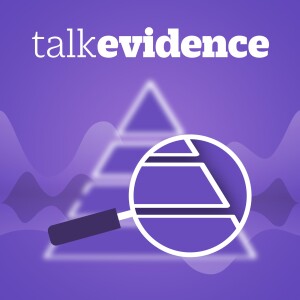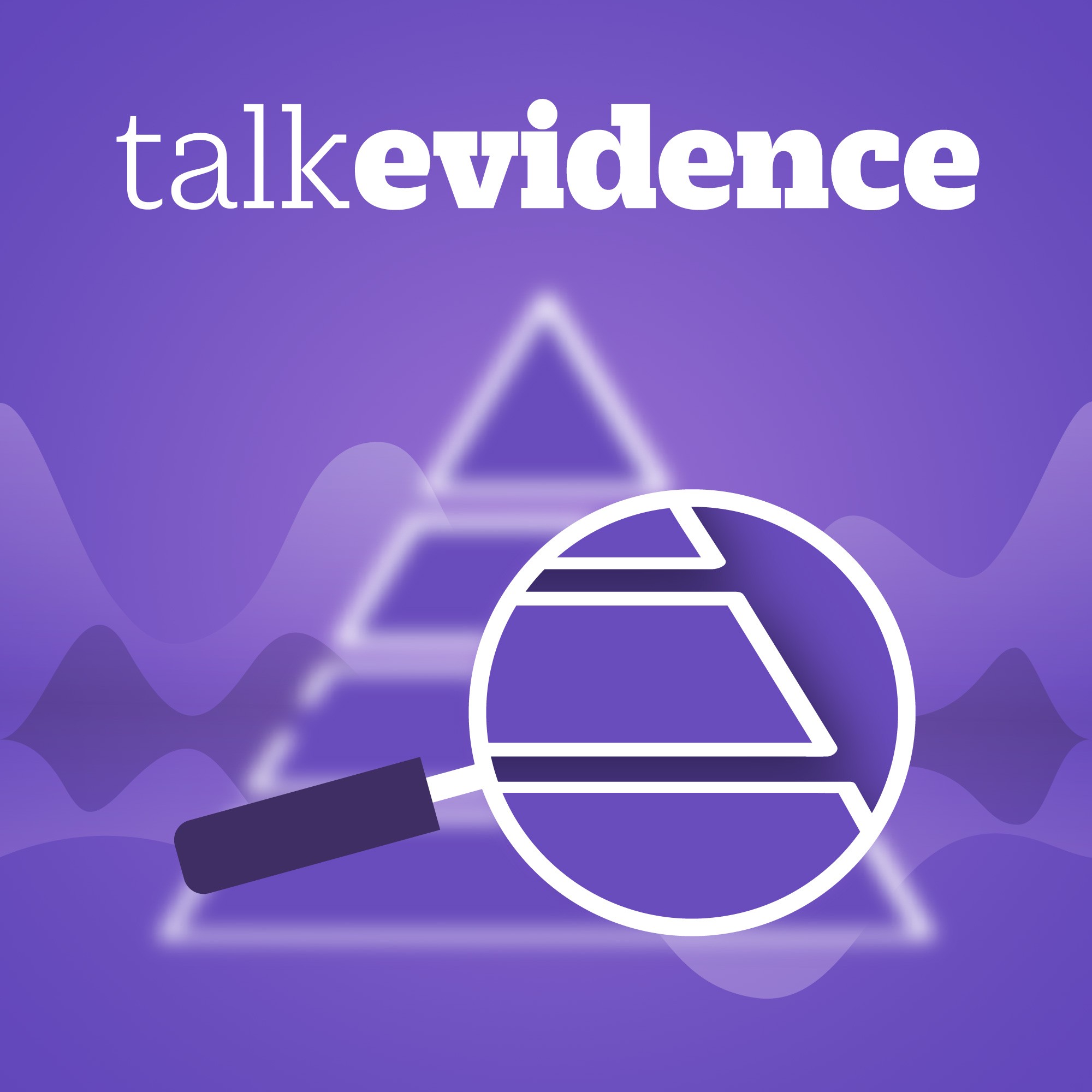Episodes

Friday Sep 03, 2021
Talk Evidence - real world vaccine data, GP records and CVD
Friday Sep 03, 2021
Friday Sep 03, 2021
In this month's Talk Evidence, Helen Macdonald and Joe Ross are back with a wry look at the world of Evidence Based Medicine. They give us a round up of real world data emerging to address various uncertainties about vaccinations against covid Helen has an update on NHS Digital’s project to extract GP coding for planning of healthcare and research, and talks to Natalie Banner from Understanding Patient Data, to find out what the public really cares about. Finally, as routine care must go on a clinical review on cardiovascular disease in older adults introduces us to geroscience. Reading list Vaccines; Effectiveness of BNT162b2 and mRNA-1273 covid-19 vaccines against symptomatic SARS-CoV-2 infection and severe covid-19 outcomes in Ontario, Canada: test negative design study - https://doi.org/10.1136/bmj.n1943 Effectiveness of the CoronaVac vaccine in older adults during a gamma variant associated epidemic of covid-19 in Brazil: test negative case-control study - https://doi.org/10.1136/bmj.n2015 Associations of BNT162b2 vaccination with SARS-CoV-2 infection and hospital admission and death with covid-19 in nursing homes and healthcare workers in Catalonia: prospective cohort study https://doi.org/10.1136/bmj.n1868 Risk of thrombocytopenia and thromboembolism after covid-19 vaccination and SARS-CoV-2 positive testing: self-controlled case series study - https://doi.org/10.1136/bmj.n1931 CVD
Cardiovascular care of older adults - https://doi.org/10.1136/bmj.n1593

Wednesday Jul 21, 2021
Talk Evidence - Freedom Day
Wednesday Jul 21, 2021
Wednesday Jul 21, 2021
The 19th of July in the UK saw the relaxation of covid rules that have been in place for 18 months - social distancing requirements in venues, mask wearing in public will no longer be legally mandated. There are a lot of questions about what this will mean for the pandemic, and in this episode of Talk Evidence Helen MacDonald, Joe Ross and Duncan Jarvies are joined by Iain Buchan, professor of public health in Liverpool, who has been involved in 2 key studies on covid transmission. Firstly, lateral flow tests - the big questions has been how well do they work in the wild - and how well do they have to work, to be useful in test trace and isolate? Iain tells us about new research into the innova test. Secondly, events - the football has shown that events can still be a big source of transmission, and the UK government put in place a number of trial events, all carefully monitored by public health researchers - Iain tells us about one nightclub test in Liverpool, and what we can glean from it. Reading list; Performance of the Innova SARS-CoV-2 antigen rapid lateral flow test in the Liverpool asymptomatic testing pilot: population based cohort study https://www.bmj.com/content/374/bmj.n1637 The UK government's events programme https://www.gov.uk/government/publications/events-research-programme-phase-i-findings/events-research-programme-phase-i-findings#findings https://assets.publishing.service.gov.uk/government/uploads/system/uploads/attachment_data/file/979461/S1195_Science_framework_for_opening_up_group_events.pdf Effect of the covid-19 pandemic in 2020 on life expectancy across populations in the USA and other high income countries: simulations of provisional mortality data https://www.bmj.com/content/373/bmj.n1343 Optimizing Therapy to Prevent Avoidable Hospital Admissions in Multimorbid Older Adults (OPERAM): cluster randomised controlled trial https://www.bmj.com/content/374/bmj.n1585 Efficacy, acceptability, and safety of muscle relaxants for adults with non-specific low back pain: systematic review and meta-analysis
https://www.bmj.com/content/374/bmj.n1446

Sunday Jun 20, 2021
Talk Evidence - GP data, excess mortality and FDA approval
Sunday Jun 20, 2021
Sunday Jun 20, 2021
In this Talk Evidence, Helen Macdonald, Joe Ross and Duncan Jarvies discuss what's going on in the world of EBM. Firstly, a while ago on the podcast, we concluded that excess mortality would be the best way to measure the impact of the pandemic - and now a new paper looks at different country's excess mortalitites over the past year. We're joined by author Nazrul Islam Physician-Epidemiologist at the University of Oxford (and a research editor for The BMJ) to talk about why comparisons may still not be sensible. Read the full research here - https://www.bmj.com/content/373/bmj.n1137 The Delta variant is dominating headlines, and infections in the UK now - but until recently the Alpha one was ascendent, and new research has helped characterise how the mortality rate of that variant differed from previous viruses. We discuss how that research was done. Read the full research - https://www.bmj.com/content/372/bmj.n579 GP data in the UK - the planned cut-off for granting access to your GP data for researchers has been extended, but there are still a lot of questions remaining. Helen has tried to find out some basic answers, and is still confused. Finally, the FDA has approved a new drug for treatment of dementia - and researchers (and the FDA's own panel of experts) are up in arms. Joe Ross tells us why he thinks the decision was the wrong one, and why patients may be harmed because of it.
https://edition.cnn.com/2021/06/17/opinions/biogen-alzheimers-drug-opinion-ramachandra-ross/index.html

Friday May 14, 2021
Friday May 14, 2021
In this week's Talk Evidence, Joe Ross, BMJ editor and professor at Yale again joins Helen Macdonald to talk about emerging evidence on Covid-19. They also welcome to the podcast Juan Franco, family physician in Buenos Aires, and professor at the Instituto Universitario Hospital Italiano, and new editor-in-chief of BMJ Evidence Based Medicine. This week, the team bring you updates on; Post-covid syndrome in individuals admitted to hospital with covid-19 - how are people with long covid faring. Finally published research from Scandinavia on the risk of thrombotic events after administration of the Oxford-AstraZeneca vaccine - how big is the risk, and what does that mean for the overall benefit of that vaccine. How difficult the UK population found it to understand and stick to the rules with our test, trace and isolate system - and some of the questions that this raises for this public health approach. and finally, research that showed non-drug interventions are as good as pharmaceuticals at treating people with depression and dementia - and the holistic effect that alleviating depression can have. Full reading list Ayoubkhani, Daniel, Kamlesh Khunti, Vahé Nafilyan, Thomas Maddox, Ben Humberstone, Ian Diamond, and Amitava Banerjee. 2021. “Post-Covid Syndrome in Individuals Admitted to Hospital with Covid-19: Retrospective Cohort Study.” BMJ 372 (March): n693. https://www.bmj.com/content/372/bmj.n693 Pottegård, Anton, Lars Christian Lund, Øystein Karlstad, Jesper Dahl, Morten Andersen, Jesper Hallas, Øjvind Lidegaard, et al. 2021. “Arterial Events, Venous Thromboembolism, Thrombocytopenia, and Bleeding after Vaccination with Oxford-AstraZeneca ChAdOx1-S in Denmark and Norway: Population Based Cohort Study.” BMJ 373 (May): n1114. https://www.bmj.com/content/373/bmj.n1114 Smith, Louise E., Henry W. W. Potts, Richard Amlôt, Nicola T. Fear, Susan Michie, and G. James Rubin. 2021. “Adherence to the Test, Trace, and Isolate System in the UK: Results from 37 Nationally Representative Surveys.” BMJ 372 (March): n608. https://www.bmj.com/content/372/bmj.n608 Watt, Jennifer A., Zahra Goodarzi, Areti Angeliki Veroniki, Vera Nincic, Paul A. Khan, Marco Ghassemi, Yonda Lai, et al. 2021. “Comparative Efficacy of Interventions for Reducing Symptoms of Depression in People with Dementia: Systematic Review and Network Meta-Analysis.” BMJ 372 (March): n532.
https://www.bmj.com/content/372/bmj.n532

Friday Apr 02, 2021
Talk Evidence - children and covid, varients of concern, ivormectin update
Friday Apr 02, 2021
Friday Apr 02, 2021
The evidence geekery continues, and this week Helen Macdonald and Duncan Jarvies are joined again by Joe Ross, The BMJ's US research editor, and professor of medicine and public health at Yale. This week we update you on treatment - the WHO's guidelines for covid and ivermectin, and why they're not ready to recommend it's use in treatment, and prophylactic anticoagulation treatment. We hear about two papers from the UK and Switzerland which look at children and covid, and we pick up on varients of concern and long covid. Reading list. Association between living with children and outcomes from covid-19: OpenSAFELY cohort study of 12 million adults in England https://www.bmj.com/content/372/bmj.n628 Clustering and longitudinal change in SARS-CoV-2 seroprevalence in school children in the canton of Zurich, Switzerland: prospective cohort study of 55 schools https://www.bmj.com/content/372/bmj.n616 Risk of mortality in patients infected with SARS-CoV-2 variant of concern 202012/1: matched cohort study https://www.bmj.com/content/372/bmj.n579 Early initiation of prophylactic anticoagulation for prevention of coronavirus disease 2019 mortality in patients admitted to hospital in the United States: cohort study https://www.bmj.com/content/372/bmj.n311 Editorial - Prophylactic anticoagulation for patients in hospital with covid-19 https://www.bmj.com/content/372/bmj.n487 Living with Covid19 – Second review - Informative and accessible health and care research
https://evidence.nihr.ac.uk/themedreview/living-with-covid19-second-review/

Friday Mar 12, 2021
Talk Evidence - Inside the JCVI, and the key to grading evidence
Friday Mar 12, 2021
Friday Mar 12, 2021
In a slightly different talk evidence, Helen Macdonald and Duncan Jarvies are bringing you a couple, of in depth interviews, Firstly, Anthony Harnden, GP, academic and member of the UK's Joint Committee on Vaccination and Immunisation takes us inside their decision making, and explains what evidence they look at, how they assess it, and what the next year of vaccination may look like. Also in this episode, Gordon Guyatt, one of the founders of EBM, joins us to talk about Grade - the framework in which evidence for guidelines can be assessed - and explains why the most important thing is not the RCTs, but being very clear about what the guideline is supposed to achieve. https://www.gov.uk/government/groups/joint-committee-on-vaccination-and-immunisation
https://www.gradeworkinggroup.org/

Friday Feb 12, 2021
Friday Feb 12, 2021
The evidence geekery continues, and this week Helen Macdonald and Duncan Jarvies are joined by Joe Ross, The BMJ's US research editor, and professor of medicine and public health at Yale. This week we pick up on a preprint in medRxiv, which has been attracting attention on social media - it tries to look at the longer term effects of covid hospitalisation. Joe explains why he thinks propensity matching can be summarised as "doing your best". Finally, as more and more care moves remotely, we discuss a trial on a digital intervention to help manage poorly controlled hypertension remotely. Reading list: Epidemiology of post-COVID syndrome following hospitalisation with coronavirus: a retrospective cohort study https://www.medrxiv.org/content/10.1101/2021.01.15.21249885v1.full.pdf Home and Online Management and Evaluation of Blood Pressure (HOME BP) using a digital intervention in poorly controlled hypertension: randomised controlled trial
https://www.bmj.com/content/372/bmj.m4858

Saturday Jan 16, 2021
Talk Evidence - Lateral flow tests update, not the best public health approach
Saturday Jan 16, 2021
Saturday Jan 16, 2021
In this episode of Talk Evidence, Jon Deeks, professor of biostatistics at the University of Birmingham, returns to the pod with an update on lateral flow tests - and why the government plan for using them in asymptomatic screening for covid-19 doesn't follow the science. We're also joined by Allyson Pollock, clinical professor of public health at Newcastle University, and author of a recent editorial in The BMJ about asymptomatic transmission of SARS-CoV-2. She explains why she thinks supporting social isolation is the missing piece of our approach to tackling the pandemic. Covid-19 INNOVA testing in schools: don’t just test, evaluate https://blogs.bmj.com/bmj/2021/01/12/covid-19-innova-testing-in-schools-dont-just-test-evaluate/ Asymptomatic transmission of covid-19
https://www.bmj.com/content/371/bmj.m4851

